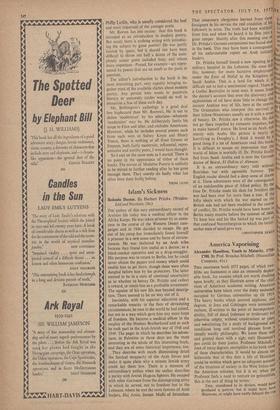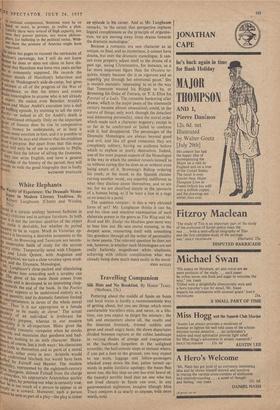America Vaporising
THIS enormous book (675 pages, of which two' fifths are footnotes) is also an unusually deplor- able book, for reasons which are worth dwelling upon briefly, as they illustrate some of the chief vices of American academic writing. American universities have taken over the dusty eminence occupied by German universities up till 1914. The heavy books which secured applause, and degrees, at Jena and Gottingen were immenselY verbose, ill-written to the point of incomprehen- sibility, full of detail (relevant or irrelevant) but otherwise empty, without construction or plan, and sikstituting for a study of background and conditions long and involved phrases from 3 usually woolly philosophy. We knew them well and greeted them with a sigh; only Housman's pen could do them justice. Professor Mitchell, 3 man of many degrees, exemplifies in his book most of these characteristics. It would be almost Un- believable that at this date a life of Hamilton could be written which gave no adequate account of the structure of society in the West Indies arid the American colonies, but it is so; when the Professor feels a need to venture on generalities, this is the sort of thing he writes: Time, abandoned to its devices, would have produced a pattern, but it might have been disastrous, or might have vastly delayed the rise 10 national competence. Someone must be on band, to resist, to prompt, to realise a plan. Luckily there were several of high capacity, nor Were they poorer patriots, nor worse philoso- Phers, for buffeting in the political melee. With- out them the promise of America might have N'aPori scd,
he takes ten pages to recount the intricacies of Milton's parentage, but I still do not know flier he does or does not claim to have dis- ered that Hamilton was born two years earlier
11 is commonly supposed. He records the acutest details of Hamilton's behaviour and Mls as Washington's aide-de-camp, but gives account at all of the progress of the War of ePendence, so that the letters and events ain meaningless to anyone who is not already expert. He makes even Benedict Arnold's acis°n and Major Andre's execution into a dull baffling episode, by omitting to tell the story z;-etlY—or indeed at all, for Andre's death is mentioned obliquely. Only on the important tter of finance does he rise to comparative rilY; money he understands, or at least it °Iiuses some emotion in him, and it is possible to r (I'x' what he says and observe that his erudition :1.es a purpose. But apart from that this tnega "olt will only be of use to aspirants to PhDs, c; can face the labour of sifting the footnotes. lb face can write English, and have a general :?syledge of the history of the period, they will uvide us with the good biography that is badly
eded. RAYMOND POSTGATE































 Previous page
Previous page